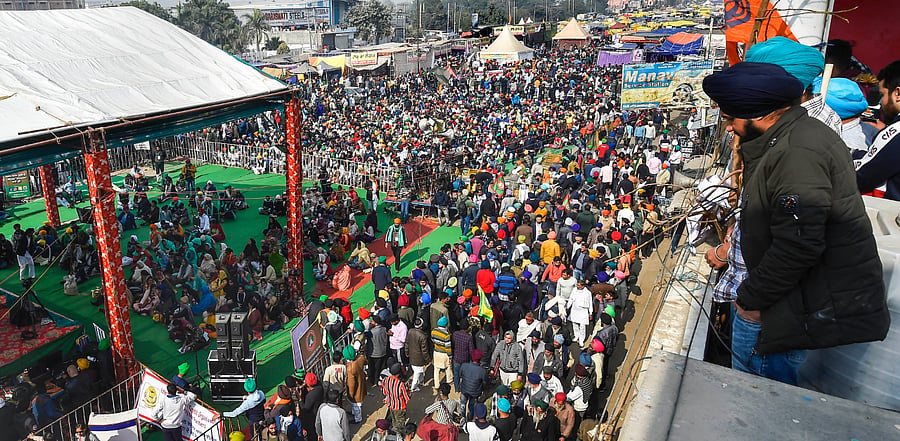
Concertina wires splayed across concrete swathes. Serried rows of iron nails punched in the ground. Barricades fortified with iron spikes. No access to water and toilets. Internet snapped. Unprecedented deployment of police and paramilitary forces. If these images make for a political statement, it is, here’s a country at war with itself. The Centre brought out the jackboot and the iron hand against the farmers protesting the disputatious farm laws at three sites on the Delhi borders abutting Haryana and Uttar Pradesh.
After the siege on the Red Fort on January 26 and the police-protestor clashes, the Centre abandoned its intent to engage with the farmers. It responded to the Opposition on its terms. Virtually ruling out a political dialogue, the BJP seems focussed on speaking with its core constituents and the church of believers. The primary message is to reinforce a belief that the popular mandates the BJP received since 2014, in the Lok Sabha and the state legislatures, are not meant to be wasted in placating and appeasing dissent. The mandates should amplify the authority of the Centre and BJP state governments and ensure their decrees are not challenged or questioned.
The decree was what the farm laws are because they were passed without debate and discussion in Parliament. Parliament is presently meeting to pass the Budget and the Finance Bill but it opened a window to the government to reach out to the Opposition, divided and ineffectual as it is, demanded a belated debate on the laws. The government is disinclined to have one and prefers to club it with the discussion on the Motion of Thanks to the President’s joint address so that the impact is not felt in the entirety.
However, just as the agitation spreads prairie-fire like in the rural hinterland, reactions emanated from unexpected quarters. On a single day, Rihanna, the pop singer, Greta Thunberg, the celebrated climate activist, and Meena Harris, US vice-president Kamala Harris’s niece articulated their outrage at the combat boot and mailed fist on display against the farmers, as though in concert. Following Rihanna’s intervention, other big names and influencers weighed in. These were Lilly Singh, Canadian YouTuber and talk show host, Jamie Margolin, US climate change activist, Elizabeth Wathuti, Kenyan environmentalist and founder of the Green Generation Initiative and Khaled Beydoun, a law professor at the University of Arkansas. Of course, Meena, Greta and Rihanna didn’t work in tandem but when celebrities take note of occurrences far removed from their universe, it was impossible for a seemingly unflappable Centre to sit tight.
India’s foreign ministry issued a statement that alleged “vested interest groups” tried to enforce their agenda on the protests, claimed the laws were passed after “full debate and discussion” in Parliament and facilitated “economically and ecologically sustainable farming”. The last argument was a Greta put-down. She was panned on social media by BJP cheerleaders for talking on an issue she was “ignorant” about.
That wasn’t the government’s only counter. Hashtagged “India against Propaganda”, central ministers Nirmala Sitharaman and Kiren Rijiju called for a “better understanding of the issues on hand” while Rijiju demanded to know who instigated the “plot to defame India”. Film stars Akshay Kumar and Suniel Shetty, counted among the pro-BJP voices in Bollywood, denounced the dissemination of “half truths” in the West’s support to the protesting farmers.
The foreign ministry’s response was proof that while the BJP and its ecosystem could quash domestic support for the protests through an army of trolls apart from the establishment, ignoring international censure was not easy. After the criticism over the 2002 Gujarat communal violence, as the state chief minister, Prime Minister Narendra Modi worked overtime through his bureaucracy and the large diaspora to shore up his plummeted rankings in the West. It was a long haul that he overcame after 2014.
In the BJP and the RSS’s world view, international relations are essentially transactional and dictated by business interests. As the adverse notices to the protests showed, this outlook is narrow because opinions come in all shades and governments can’t pick and choose the colours.
On home ground, that ultimately tests a party’s success and failure, the BJP was ostensibly more confident of riding the perceptible wave of discontent and despair. It has polarised institutions so deep that its backers are willingly persuaded by the view that the opponents of the farm laws are “anti-Modi” and by extension, “anti-national”.
The BJP’s feedback in Haryana and Uttar Pradesh, the other battlegrounds apart from Punjab, was that farmers were segregated along caste and regional lines. In UP, for instance, the peasantry churn has not travelled southward to the central and eastern belts. In Haryana, ground reports suggest that non-Jat farmers are not in solidarity with the Jats. In the 2014 Haryana Assembly elections, the BJP successfully drove a wedge between the Jats and the non-Jats and mobilised the support of the latter, a teeming block against Jats.
If elections are treated as a barometer of political resilience and durability—as the BJP tends to—the ruling party is convinced it has little to fear from the farmers’ protests apart from living with bad optics and adversarial notices from the world community.
(Radhika Ramaseshan is a Delhi-based political analyst and columnist)
The views expressed above are the author’s own. They do not necessarily reflect the views of DH.